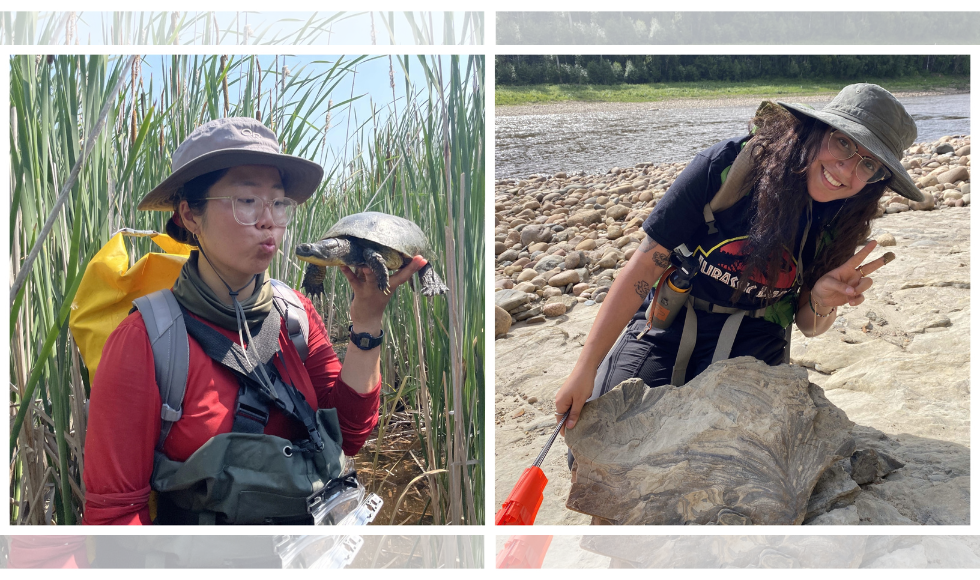Grad students clear barriers to field work for BIPOC students

Reta Meng and Angelina Abi Daoud are the founding co-directors of the McMaster chapter of Field Research in Ecology and Evolution Diversified (FREED). The grassroots organization offers free field work excursions for BIPOC undergrads.
BY Jay Robb, Faculty of Science
May 9, 2025
Field work can be a game changer for undergrads.
But it’s also prohibitively expensive for students on tight budgets, and can be overwhelming if they’ve spent little time outdoors.
Graduate students Reta Meng and Angelina Abi Daoud can relate.
Meng’s three-week stint at the Long Point Bird Observatory, “an amazing once-in-a-lifetime experience,” also put serious strain on her undergraduate finances. And as a field work novice, she suffered acute cases of imposter syndrome and homesickness.
For Daoud, summer field work was never an option. From the start of May to the end of August, she helped out at her father’s pizza shop back home in Nova Scotia.
“Doing field work unlocks great summer jobs, but if you can’t do the field work, you can’t get those jobs.”
Both also had to take a pass on undergraduate field work courses, something that motivated Meng and Daoud to start the McMaster chapter of Field Research in Ecology and Evolution Diversified (FREED).
Launched by graduate students at the University of Toronto and Western University, FREED is a grassroots organization that removes barriers to field work for Indigenous, Black and/or racialized undergraduate students who face the added barrier of historical and ongoing marginalization in science, technology, engineering and math.
All FREED excursions are free, with students receiving bursaries and subsidies for accommodations, equipment and transportation.
“I wish FREED had been around at McMaster when I was an undergraduate,” says Daoud.
A supportive, no-pressure excursion
FREED’s a passion project for Meng and Daoud who already have more than enough work on their plates — Meng’s a PhD candidate in Biology with the Chow-Fraser Lab, while Daoud’s a graduate student in the School of Earth, Environment and Society (SEES).
They’re serving as the founding co-directors with support from Mac grad Whadia Khwaja, who handles finance; PhD student Libby Tunney, who manages logistics; and Eliza Ritchie and Amber Chanthavong, who serve as undergraduate student ambassadors.
“FREED’s mission aligns completely with my core values,” says Daoud. “Making a real difference in people’s lives is deeply fulfilling.”
Last year, Meng and Daoud organized a week-long excursion for 15 McMaster and University of Guelph BIPOC students to the Algonquin Wildlife Research Station.

The excursion featured field work and naturalist skills-building workshops, including a Turtle 101 workshop by Meng, a “Geology Rocks” workshop by Daoud, and sessions on how to pitch a tent, build a bonfire and paddle a canoe (courtesy of Alecia Golding and Darci Burtch with Paddle Like a Girl).
Students also went on a guided plant medicine and moon walk with Christine Luckasavitch, Omàmìwininì Madaoueskarini Anishinaabekwe (a woman of the Madawaska River Algonquin people) from Waaseyaa Consulting.
This summer, they’re bringing 10 students to Valens Lake Conservation Area for a week in August.
There’s no pressure on “FREEDlings” to collect data, there’s no grading or assignments and student to supervisor ratios are kept low.
“It’s an experience where students feel safe and supported in every way possible from start to finish,” says Meng.
Along with building skills and confidence, FREED builds community by connecting undergrads with BIPOC grad students, young professionals, faculty sponsors and potential employers from industry, government, nongovernmental organizations and conservation organizations who also deliver workshops.
Last year, faculty members Léa Ravensbergen and Susan Dudley, plus University of Guelph’s Joey Bernhardt and Edeline Gagnon made the trek to Algonquin Park.
This year, Biology’s Emily Choy, SEES’ Elli Papangelakis and Adrianne Lickers Xavier from Indigenous Studies have signed on as faculty sponsors.

“It takes a village and there are many fingerprints on this program to make it a resounding success,” says Meng.
An opportunity to give back
While it’s incredibly rewarding, the duo say FREED comes with two big challenges.
Last year, 55 students applied. While Meng and Daoud wish every applicant could be accepted, fiscal constraints cap enrolment. For now, they rely on a rubric to identify the applicants who have had limited research opportunities, face the biggest barriers and would stand to benefit the most from FREED’s programming.
And unlike FREED chapters at other universities, the McMaster chapter has yet to find a permanent home, and that hampers fundraising efforts.
“We want FREED excursions to remain an annual tradition for as many BIPOC students as possible here at McMaster,” says Meng.
“It’s such a great way to introduce undergrads to field work and give grad students the opportunity to give back.”


